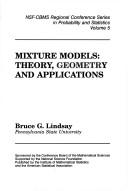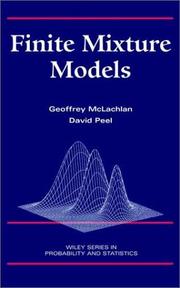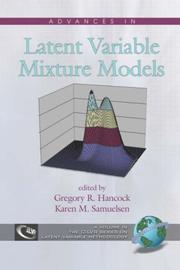| Listing 1 - 8 of 8 |
Sort by
|

ISBN: 0940600323 Year: 1995 Publisher: Hayward, Calif. Institute of Mathematical Statistics
Abstract | Keywords | Export | Availability | Bookmark
 Loading...
Loading...Choose an application
- Reference Manager
- EndNote
- RefWorks (Direct export to RefWorks)
Mixture distributions (Probability theory) --- #SBIB:303H510 --- Compound distributions (Probability theory) --- Distributions, Mixture (Probability theory) --- Mixed distributions (Probability theory) --- Mixing distributions (Probability theory) --- Mixtures of distributions (Probability theory) --- Distribution (Probability theory) --- Methoden sociale wetenschappen: statistische technieken, algemeen --- Mathematical statistics

ISBN: 0471006262 9780471006268 Year: 2000 Publisher: New York : Wiley,
Abstract | Keywords | Export | Availability | Bookmark
 Loading...
Loading...Choose an application
- Reference Manager
- EndNote
- RefWorks (Direct export to RefWorks)
Mathematical statistics --- Mixture distributions (Probability theory) --- 519.2 --- Probability. Mathematical statistics --- 519.2 Probability. Mathematical statistics --- Mixture distributions (Probability theory). --- Compound distributions (Probability theory) --- Distributions, Mixture (Probability theory) --- Mixed distributions (Probability theory) --- Mixing distributions (Probability theory) --- Mixtures of distributions (Probability theory) --- Distribution (Probability theory) --- Mixture distribution --- Probability theory
Book
ISBN: 0824776917 9780824776916 Year: 1988 Volume: 84 Publisher: New York (N.Y.) : Dekker,
Abstract | Keywords | Export | Availability | Bookmark
 Loading...
Loading...Choose an application
- Reference Manager
- EndNote
- RefWorks (Direct export to RefWorks)
Mathematical statistics --- Cluster analysis --- Mixture distributions (Probability theory) --- Cluster analysis. --- Compound distributions (Probability theory) --- Distributions, Mixture (Probability theory) --- Mixed distributions (Probability theory) --- Mixing distributions (Probability theory) --- Mixtures of distributions (Probability theory) --- Distribution (Probability theory) --- Correlation (Statistics) --- Multivariate analysis --- Spatial analysis (Statistics) --- Mixture distributions (Probability theory).
Book
ISBN: 0471907634 9780471907633 Year: 1985 Publisher: Chichester: Wiley,
Abstract | Keywords | Export | Availability | Bookmark
 Loading...
Loading...Choose an application
- Reference Manager
- EndNote
- RefWorks (Direct export to RefWorks)
Mathematical statistics --- Mixture distributions (Probability theory) --- 519.23 --- Compound distributions (Probability theory) --- Distributions, Mixture (Probability theory) --- Mixed distributions (Probability theory) --- Mixing distributions (Probability theory) --- Mixtures of distributions (Probability theory) --- Distribution (Probability theory) --- Statistical analysis. Inference methods --- 519.23 Statistical analysis. Inference methods

ISBN: 1281413011 9786611413019 1607526344 9781607526346 9781593118471 1593118473 9781593118488 1593118481 1593118473 1593118481 9781281413017 6611413014 Year: 2008 Publisher: Charlotte, NC : Information Age Pub.,
Abstract | Keywords | Export | Availability | Bookmark
 Loading...
Loading...Choose an application
- Reference Manager
- EndNote
- RefWorks (Direct export to RefWorks)
Plaintext description.
Latent structure analysis. --- Latent variables. --- Mixture distributions (Probability theory) --- Compound distributions (Probability theory) --- Distributions, Mixture (Probability theory) --- Mixed distributions (Probability theory) --- Mixing distributions (Probability theory) --- Mixtures of distributions (Probability theory) --- Distribution (Probability theory) --- Constructs, Hypothetical --- Hypothetical constructs --- Variables, Latent --- Latent structure analysis --- Multivariate analysis --- Variables (Mathematics) --- Correlation (Statistics) --- Latent variables --- Mathematical statistics
Book
ISBN: 3319980297 3319980289 Year: 2018 Publisher: Cham : Springer International Publishing : Imprint: Springer,
Abstract | Keywords | Export | Availability | Bookmark
 Loading...
Loading...Choose an application
- Reference Manager
- EndNote
- RefWorks (Direct export to RefWorks)
This book presents recent results in finite mixtures of skewed distributions to prepare readers to undertake mixture models using scale mixtures of skew normal distributions (SMSN). For this purpose, the authors consider maximum likelihood estimation for univariate and multivariate finite mixtures where components are members of the flexible class of SMSN distributions. This subclass includes the entire family of normal independent distributions, also known as scale mixtures of normal distributions (SMN), as well as the skew-normal and skewed versions of some other classical symmetric distributions: the skew-t (ST), the skew-slash (SSL) and the skew-contaminated normal (SCN), for example. These distributions have heavier tails than the typical normal one, and thus they seem to be a reasonable choice for robust inference. The proposed EM-type algorithm and methods are implemented in the R package mixsmsn, highlighting the applicability of the techniques presented in the book. This work is a useful reference guide for researchers analyzing heterogeneous data, as well as a textbook for a graduate-level course in mixture models. The tools presented in the book make complex techniques accessible to applied researchers without the advanced mathematical background and will have broad applications in fields like medicine, biology, engineering, economic, geology and chemistry.
Mixture distributions (Probability theory) --- Mathematical statistics --- Data processing. --- Compound distributions (Probability theory) --- Distributions, Mixture (Probability theory) --- Mixed distributions (Probability theory) --- Mixing distributions (Probability theory) --- Mixtures of distributions (Probability theory) --- Distribution (Probability theory) --- Mathematical statistics. --- Statistics. --- Statistical Theory and Methods. --- Statistics for Life Sciences, Medicine, Health Sciences. --- Statistics and Computing/Statistics Programs. --- Statistical analysis --- Statistical data --- Statistical methods --- Statistical science --- Mathematics --- Econometrics --- Statistical inference --- Statistics, Mathematical --- Statistics --- Probabilities --- Sampling (Statistics) --- Statistics .
Book
ISBN: 1280726725 9786610726721 0387357688 Year: 2006 Publisher: New York : Springer,
Abstract | Keywords | Export | Availability | Bookmark
 Loading...
Loading...Choose an application
- Reference Manager
- EndNote
- RefWorks (Direct export to RefWorks)
The prominence of finite mixture modelling is greater than ever. Many important statistical topics like clustering data, outlier treatment, or dealing with unobserved heterogeneity involve finite mixture models in some way or other. The area of potential applications goes beyond simple data analysis and extends to regression analysis and to non-linear time series analysis using Markov switching models. For more than the hundred years since Karl Pearson showed in 1894 how to estimate the five parameters of a mixture of two normal distributions using the method of moments, statistical inference for finite mixture models has been a challenge to everybody who deals with them. In the past ten years, very powerful computational tools emerged for dealing with these models which combine a Bayesian approach with recent Monte simulation techniques based on Markov chains. This book reviews these techniques and covers the most recent advances in the field, among them bridge sampling techniques and reversible jump Markov chain Monte Carlo methods. It is the first time that the Bayesian perspective of finite mixture modelling is systematically presented in book form. It is argued that the Bayesian approach provides much insight in this context and is easily implemented in practice. Although the main focus is on Bayesian inference, the author reviews several frequentist techniques, especially selecting the number of components of a finite mixture model, and discusses some of their shortcomings compared to the Bayesian approach. The aim of this book is to impart the finite mixture and Markov switching approach to statistical modelling to a wide-ranging community. This includes not only statisticians, but also biologists, economists, engineers, financial agents, market researcher, medical researchers or any other frequent user of statistical models. This book should help newcomers to the field to understand how finite mixture and Markov switching models are formulated, what structures they imply on the data, what they could be used for, and how they are estimated. Researchers familiar with the subject also will profit from reading this book. The presentation is rather informal without abandoning mathematical correctness. Previous notions of Bayesian inference and Monte Carlo simulation are useful but not needed. Sylvia Frühwirth-Schnatter is Professor of Applied Statistics and Econometrics at the Department of Applied Statistics of the Johannes Kepler University in Linz, Austria. She received her Ph.D. in mathematics from the University of Technology in Vienna in 1988. She has published in many leading journals in applied statistics and econometrics on topics such as Bayesian inference, finite mixture models, Markov switching models, state space models, and their application in marketing, economics and finance.
Mixture distributions (Probability theory) --- Markov processes. --- Analysis, Markov --- Chains, Markov --- Markoff processes --- Markov analysis --- Markov chains --- Markov models --- Models, Markov --- Processes, Markov --- Stochastic processes --- Compound distributions (Probability theory) --- Distributions, Mixture (Probability theory) --- Mixed distributions (Probability theory) --- Mixing distributions (Probability theory) --- Mixtures of distributions (Probability theory) --- Distribution (Probability theory) --- Distribution (Probability theory. --- Mathematical statistics. --- Econometrics. --- Computer science. --- Bioinformatics. --- Psychometrics. --- Probability Theory and Stochastic Processes. --- Statistical Theory and Methods. --- Probability and Statistics in Computer Science. --- Measurement, Mental --- Measurement, Psychological --- Psychological measurement --- Psychological scaling --- Psychological statistics --- Psychology --- Psychometry (Psychophysics) --- Scaling, Psychological --- Psychological tests --- Scaling (Social sciences) --- Bio-informatics --- Biological informatics --- Biology --- Information science --- Computational biology --- Systems biology --- Informatics --- Science --- Economics, Mathematical --- Statistics --- Mathematics --- Statistical inference --- Statistics, Mathematical --- Probabilities --- Sampling (Statistics) --- Distribution functions --- Frequency distribution --- Characteristic functions --- Measurement --- Scaling --- Methodology --- Data processing --- Statistical methods --- Probabilities. --- Statistics . --- Statistical analysis --- Statistical data --- Statistical science --- Econometrics --- Probability --- Combinations --- Chance --- Least squares --- Mathematical statistics --- Risk
Book
ISBN: 3642088163 3540686509 9786612036613 1282036610 3540686517 Year: 2009 Publisher: [Berlin] : Springer-Verlag,
Abstract | Keywords | Export | Availability | Bookmark
 Loading...
Loading...Choose an application
- Reference Manager
- EndNote
- RefWorks (Direct export to RefWorks)
The book shows how to model heterogeneity in medical research with covariate adjusted finite mixture models. The areas of application include epidemiology, gene expression data, disease mapping, meta-analysis, neurophysiology and pharmacology. After an informal introduction the book provides and summarizes the mathematical background necessary to understand the algorithms. The emphasis of the book is on a variety of medical applications such as gene expression data, meta-analysis and population pharmacokinetics. These applications are discussed in detail using real data from the medical literature. The book offers an R package which enables the reader to use the methods for his/her needs.
Biometry. --- Medical statistics. --- Medical statistics --- Biometry --- Data Interpretation, Statistical --- Models, Statistical --- Meta-Analysis as Topic --- Models, Theoretical --- Decision Support Techniques --- Epidemiologic Research Design --- Statistics as Topic --- Research Design --- Investigative Techniques --- Medical Informatics Applications --- Methods --- Health Care Evaluation Mechanisms --- Epidemiologic Methods --- Public Health --- Quality of Health Care --- Medical Informatics --- Analytical, Diagnostic and Therapeutic Techniques and Equipment --- Environment and Public Health --- Information Science --- Health Care Quality, Access, and Evaluation --- Health Care --- Mathematical Statistics --- Medical Statistics --- Mathematics --- Physical Sciences & Mathematics --- Health & Biological Sciences --- Medicine --- Mixture distributions (Probability theory) --- Mathematical models. --- Compound distributions (Probability theory) --- Distributions, Mixture (Probability theory) --- Mixed distributions (Probability theory) --- Mixing distributions (Probability theory) --- Mixtures of distributions (Probability theory) --- Statistics. --- Public health. --- Epidemiology. --- Biostatistics. --- Statistics for Life Sciences, Medicine, Health Sciences. --- Public Health. --- Statistics and Computing/Statistics Programs. --- Distribution (Probability theory) --- Biomathematics --- Statistical methods. --- Mathematical statistics. --- Diseases --- Public health --- Statistical inference --- Statistics, Mathematical --- Statistics --- Probabilities --- Sampling (Statistics) --- Statistical analysis --- Statistical data --- Statistical methods --- Statistical science --- Econometrics --- Statistics . --- Biological statistics --- Biology --- Biometrics (Biology) --- Biostatistics --- Community health --- Health services --- Hygiene, Public --- Hygiene, Social --- Public health services --- Public hygiene --- Social hygiene --- Health --- Human services --- Biosecurity --- Health literacy --- Medicine, Preventive --- National health services --- Sanitation
| Listing 1 - 8 of 8 |
Sort by
|

 Search
Search Feedback
Feedback About UniCat
About UniCat  Help
Help News
News